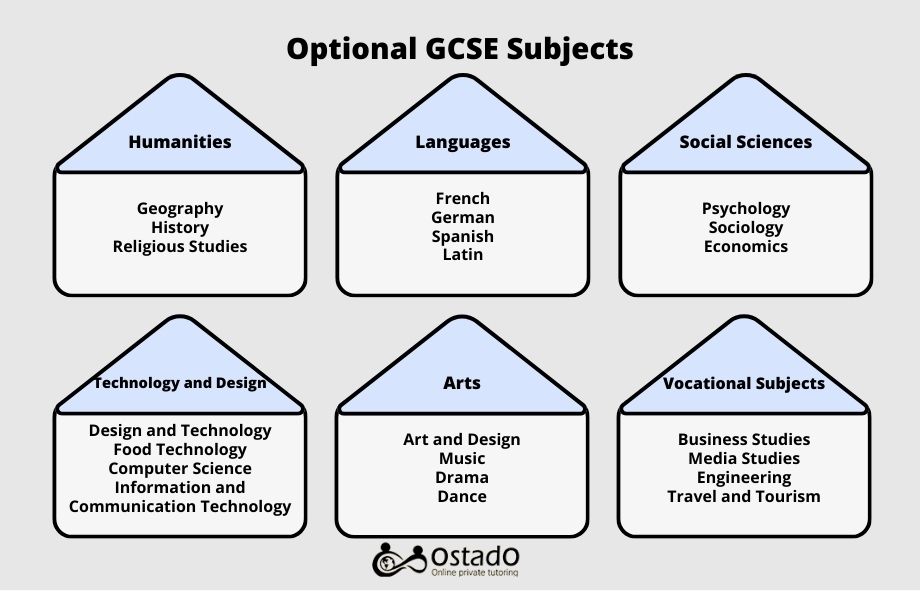The GCSEs are the first serious step you take towards higher education and significantly influence your prospective career choices. Unfortunately, the subjects you must study don’t always match your preferences.
But you have to bite the bullet and do your best to get the best grades in the GCSE compulsory subjects. These subjects include English language, Science, and Maths. Of course, schools have a say in this, and they may mandate other GCSEs as well.
Compulsory Subjects for GCSE
Compulsory GCSE subjects are more commonly known as core subjects. Your further education and career prospects depend strongly on passing core subjects. In fact, if you fail the core subjects, particularly maths and English, you must retake them until you achieve a passing grade or turn 18. Click here to learn more about retaking GCSEs.
-
English Language
GCSE English Language is intended to develop the necessary language skills (listening, reading, speaking, and writing) for academic contexts and real life.
These skills help you express yourself more accurately and effectively in discussions and debates. Also, regarding written language, you’ll learn to write in different forms, such as descriptive, argumentative, persuasive, transactional (emails and letters), etc.
Most schools cover English literature but it’s not a compulsory subject in all of them. GCSE English literature is regarded as one of the accessible GCSE qualifications. And it is a good supplement for the GCSE English language.
-
Mathematics
Maths GCSE covers a wide range of mathematical topics. You will learn about Numbers, Algebra, Geometry, Ratio, Probability, and Statistics.
GCSE maths will equip you with critical thinking and problem-solving skills you need to solve mathematical problems. Plus, you can apply your mathematical knowledge and these skills to real life.
Maths is the hardest (or at least one of the hardest) GCSE exams, and many students seek help from a GCSE maths tutor when they are revising for GCSE maths to get better results.
In parentheses:
English Language and Maths are referred to as gateway qualifications. Not all students aim to pursue higher education. Some prefer to take vocational courses and enter the workforce sooner. Most employers in England demand GCSE qualifications in Maths and English, but they are not as strict about GCSE science unless the position you’re after is directly related to GCSE science. That’s why Maths and English stand out among other GCSE qualifications.
-
Science
You can study GCSE science in two ways. The Combined Science is a two-year qualification in which you learn Physics, Chemistry, and Biology holistically. Less details are covered in Combined Science, and you’ll earn a double award GCSE in science in the end.
On the other hand, Triple Science qualifications take three years, and you will be awarded three separate qualifications for each GCSE subject. Triple Science takes a more detailed approach towards each subject, and therefore, it’s more challenging compared to Combined Science.
There are other compulsory GCSE subjects, but they’re not demanded by all schools or colleges.
| Combined Science vs Triple Science | ||
| Feature | Combined Science | Triple Science |
| Content Depth | Less detailed | More in-depth |
| Course Duration | Two years | Three years |
| GCSE Qualifications | Two (combined) | Three (separate) |
GCSE Subjects You Can Choose
Elective GCSE qualifications are the ones you can choose to acquire. Basically, they are optional, but you can’t live without them if you are considering Higher Education.
On average, students choose to acquire nine GCSE qualifications, including the core subjects. However, what matters here is how deep your understanding of each of the optional GCSEs is rather than how many GCSEs you take. Colleges or universities value high grades rather than a high number of GCSE qualifications.
Optional Subjects
Optional GCSE subjects vary among different schools, but they should at least offer a subject in one of the following areas:
- Humanities subject
- Arts
- Design and Technology
- Modern Foreign Languages
You can choose from GCSE options based on your interests. The optional subjects directly influence your university admissions and future career possibilities.

Why Are These Subjects Compulsory?
The Department of Education (DfE) has made Maths, Science, and English compulsory GCSEs to take by the end of Key Stage 4.
The logic behind the compulsory GCSEs is to ensure that all students possess the essential skills for further education, career development, and personal life. In short, these subjects are compulsory to ensure an average level of education and literacy nationwide.
Advantages of Mandatory GCSE Subjects
- Attain intellectual independence
You need at least an average knowledge of GCSE English and maths to live independently and take care of yourself. Literacy, numeracy, and communication skills are the basic requirements of living in a modern society. Compulsory subjects help you survive in real life.
- Equal chance for all
The core subjects ensure that all students in the UK receive equal and adequate education regardless of their background or school. This way, all students have an equal chance to succeed and realise their potential.
- Wider career choices
Gaining qualifications in core subjects expands your educational and career choices and helps you find better job positions, earn more, and ultimately improve the quality of your life.
Disadvantages of Mandatory GCSE Subjects
- Losing the motivation for education
Students who aren’t interested in Maths or English might feel discouraged if they are forced to continue studying them. This can also demotivate them and hinder their academic progress. It’s even worse for GCSE maths since it’s the hardest GCSE subject.
- Focus on passing rather than learning
The strict policy on the compulsory GCSE subjects may lead to a focus on “learning to the test” to ensure good grades in important exams. That is, students will make every effort to achieve good grades rather than develop skills and understand the subjects deeply.
Flip the Script With Ostado’s Tutors
Students who struggle with maths or aim to achieve higher grades usually get help from a GCSE tutors to pass GCSE maths on the first attempt and avoid maths resits. Thanks to extensive exprisence and subject matter expertise, Ostado’s tutors know which topics are the most demanding and what is the most effective way to teach them. You can book a trial sesson and check out the quality of our personalised lessons.
FAQs - Compulsory Subjects for GCSE
- How many GCSE subjects are the minimum?Students typically take a minimum of five GCSE subjects, including the core subjects. GCSE students usually take 9 GCSEs to have balanced and comprehensive qualifications.
- Can you drop GCSE subjects?Yes, you may choose to drop a GCSE subject due to a lack of interest or difficulty with the subject matter. But you should consult this decision with your parents and the school counsellor to see if the school policies allow it and if it's not too much trouble to drop the course.
- What is the hardest GCSE subject?It depend's on you abilities and interests, but according to statistics from past GCSE exams, GCSE maths is the hardest GCSE subject. Click here to check the complete list of the hardest GCSEs ranked.
- How many GCSE subjects do I need to choose?Aside from the core subjects, you should choose 3 to 4 other subjects based on your school's requirements or your interests.
- Which subjects are compulsory at GCSE?English language, Maths and Science are the subjects you have to take and pass at the GCSE level.
- Do you have to do all 3 sciences in GCSE?You can either take Combined Science GCSE which comes with a double award or Triple Science which comes with three separate GCSE qualifications for each of Physics, Chemistry, and Biology subjects. If you take Combine Science, you have to pass all three subjects to get the full qualification but if you take Triple Science and fail, for example, Biology, you will still get recogniseable qualifications for Physics and Chemistry.
- Do you have to take all the GCSEs?You only have to take the core subjects, but in order to expand your choices, be it in your future education or career, you can take five or six additional subjects that are in your best interest.
- Is English literature GCSE compulsory?English Literature might be a compulsory subject in some schools in England, but the National Curriculum doesn't specifically mandate English literature. However, the English language is a compulsory subject and most students study GCSE literature alongside it.
- What if I don’t like the compulsory GCSE subjects?If GCSE qualifications are the way you choose to higher education or career path, you must take the compulsory GCSE subjects as it is mandated by DfE, whether they’re your favorite subject or not.
- Are 6 GCSE subjects enough?It depends on your goals. Technically, you can graduate from secondary school just by passing the compulsory GCSE subjects. But if you take a wider range of subjects, you will expand your educational and professional choices. Typically, students take 8 to 10 GCSEs to have a balanced and comprehensive education.

